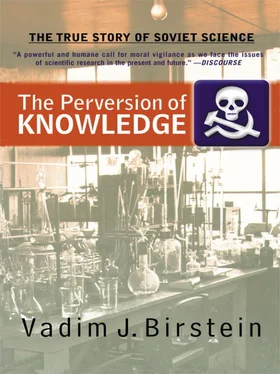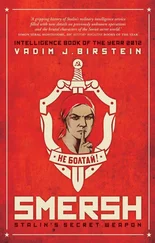46. An excerpt from the resolution, dated March 29, 1989, and signed by Senior Prosecutor of the Leningrad Region I. V. Katukova. The complete text is given in Levitskaya, N. G., and T. K. Lassan, “Materialy k biografii Grigoriya Andreevicha Levitskogo” [Materials for the biography of Grigorii Andreevich Levitsky], Tsitologiya 34 (8) (1992): 102–123 (in Russian).
47. Popovsky, The Vavilov Affair , pp. 96–98.
48. Vavilov, N. I., “The Law of Homologous Series in Variation,” Journal of Genetics 12 (1) (1922): 47–89.
49. Vavilov, Nikolai I., Centers of Cultivated Plants (Leningrad: 1926) (in Russian and English).
50. For a short biography of Vavilov, see Dobzhansky, Th., “N. I. Vavilov, a martyr of genetics,” Journal of Heredity 38 (1946): 226–232; Adams, M. B., “Vavilov, Nikolai Ivanovich,” in Gillispie, C. C., ed., Dictionary of Scientific Biography (New York: Charles Scribner’s Sons, 1978), vol. 15, supp. 1, pp. 505–513. For more details, see Popovsky, The Vavilov Affair ; and Rokityansky, Ya. G., “Golgofa Nikolaya Vavilova: Biograficheskii ocherk” [The Golgotha of Nikolai Vavilov: A biographical sketch], pp. 4–141 in Rokityansky, Ya. G., Yu. N. Vavilov, and V. A. Goncharov, eds., Sud palacha: Nikolai Vavilov v zastenkakh NKVD. Biograficheskii ocherk. Dokumenty [The Trial of an Executioner: Nikolai Vavilov in the Torture Chamber of the NKVD. A Biographical Sketch. Documents] (Moscow: Academia, 1999) (in Russian).
51. Vavilov, Yu. N., and Ya. G. Rokityansky, “Znaniya broshennye v ogon’” [Knowledge thrown into the fire], Vestnik Rossiiskoi Akademii Nauk 66 (1996): 625 (in Russian). Vavilov’s letter regarding Sobolev addressed to the OGPU is given in the appendix, pp. 631–632. The original is kept at the FSB Central Archive, p-2311, t. 8, pp. 230–231.
52. Popovsky, The Vavilov Affair , p. 162.
53. Vavilov, Yu. N., and Ya. G. Rokityansky, “Golgotha: Arkhivnye materialy o poslednikh godakh zhizni akademika N. I. Vavilova” [Golgotha: Archival materials on the last years of Academician Vavilov’s life (1940–1943)], V estnik Rossiiskoi Akademii Nauk 63 (1993): 830–846 (in Russian); Vavilov and Rokityansky, “Znaniya broshennye v ogon’.”
54. Rokityansky et al., Sud palacha .
55. The text is given in Vavilov and Rokityansky, “Golgotha,” p. 832.
56. Lebedev, D. V., “Iz memuarov antilysenkovtsa s predvoennym stazhem” [From the memoirs of an anti-Lysenkoist with a pre-war period of service], in Yaroshevsky, Repressirovannaya Nauka , p. 280.
57. Mozokhin, O. B., “Ob organizatsii ekonomicheskikh podrazdelenii OGPU” [On the organization of the OGPU economic departments], in Istoricheskie chteniya na Lubyanke 1999 god: Otechestvennye sluzhby v 20–30-e gody [History Lectures at the Lubyanka, 1999: The State Services during the 1920s–30s], available at: www.fsb.ru/history/read/1999.html.
58. Rokityansky et al., Sud palacha , pp. 142–158 (document 1). Signed by Head of the OGPU Economic Directarate (EKU) Lev Mironov (see biography in Petrov and Skorkin, Kto rukovodil NKVD , pp. 300–301) and approved by First Deputy Head of the OGPU A. Akulov (Akulov was at this position only for a year, in 1931–1932; see Conquest, Inside Stalin’s Secret Police, pp. 13–14).
59. Kokurin and Petrov, Lubyanka , pp. 12, 17, and 21.
60. Popovsky, The Vavilov Affair , pp. 143–144.
61. Kokurin and Petrov, Lubyanka , p. 23.
62. Rokityansky et al., Sud palacha , pp. 197–207 (document 8).
63. Document 1 in the appendix to Vavilov and Rokityansky, “Golgotha,” p. 835.
64. Stalin’s letter to Menzhinsky and letters to Molotov, dated August 2 and 23, 1930 (nos. 56, 57, and 59) in Lih, Lars T., Oleg V. Naumov, and Oleg V. Khlevniuk, eds., Stalin’s Letters to Molotov, 1925–1936 (New Haven: Yale University Press, 1995), pp. 195–196, 199–201, and 203–204.
65. Ibid., p. 196.
66. Ibid., pp. 191–197.
67. Stetsovsky, Istoriya , vol. 2, p. 166.
68. Ibid., vol. 1, p. 164.
69. Document 1 in the appendix to Vavilov and Rossianov, “Golgotha,” pp. 838–840.
70. Appendix to Vavilov and Rossianov, “Golgotha,” p. 837.
71. See, for instance, Conquest, Robert, The Harvest of Sorrow: Soviet Collectivization and the Terror-Famine (New York: Oxford University Press, 1986).
72. Heller and Nekrich, Utopia , pp. 222–223.
73. Appendix to Vavilov and Rossianov, “Golgotha,” p. 839.
74. Ibid., p. 839.
75. Popovsky, The Vavilov Affair , p. 80.
76. Joravsky, The Lysenko Affair , pp. 190–191; Soyfer, Lysenko , pp. 33, 82.
77. Krementsov, Stalinist Science , p. 183.
78. Popovsky, The Vavilov Affair , p. 142; Soyfer, Lysenko , p. 98.
79. Ibid., pp. 142–143. David’s testimonies were cited in the warrant for Vavilov’s arrest (appendix to Vavilov and Rokityansky, “Golgotha,” p. 840).
80. Soyfer, Lysenko , pp. 135–136.
81. Ibid., p. 145.
82. I am very grateful to my colleagues from Memorial (Moscow) who directed my attention to this report.
83. Document 110 in Rokityansky et al., Sud palacha , pp. 507–511.
84. Appendix to Vavilov and Rokityansky, “Golgotha,” p. 840.
85. Popovsky, The Vavilov Affair , pp. 128–129.
86. Document 9 in Rokityansky et al., Sud palacha , pp. 207–208.
87. Document 12 in ibid., pp. 211–212.
88. Popovsky, The Vavilov Affair , p. 158.
89. Documents 16–21, 14–26 in Rokityansky et al., Sud palacha , pp. 215–228.
90. Document 17 in ibid., pp. 216–218. The original is kept in the FSB Central archive, no. P-2311, t. 4, l. 47–49.
91. The list (document no. 4) is given in the appendix to Vavilov and Rokityansky, “Znaniya, broshennye v ogon’,” pp. 633–634, and in Rokityansky et al., Sud palacha , pp. 220–222 (document 20). The original is kept in the FSB Central Archive (no. P-2311, t. 4, l. 23–24).
92. Document 26 in Rokityansky et al., Sud palacha , pp. 226–228.
93. From July 1940 to February 26, 1941, Schwartzman was acting head of this department (Petrov and Skorkin, Kto rukovodil NKVD , p. 52).
94. Document 106 in Rokityansky et al., Sud palacha , pp. 492–493.
95. Document 28 in ibid., pp. 228–251.
96. On Karpechenko, see Lebedev, D. V., “Georgii Dmitrievich Karpechenko,” in Belyaev, Dmitrii K., and Vladimir I. Ivanov, eds., Vydauyshchesya sovetskie genetiki [Outstanding Soviet Geneticists] (Moscow: Nauka, 1980), pp. 37–48 (in Russian).
97. On Levitsky, see Prokofieva-Bel’govskaya, A. A., “Grigorii Andreevich Levitsky,” in ibid.; Adams, M., “Levitskii, Grigorii Andreevich,” in Gillispie, Dictionary of Scientific Biographies (1990), vol. 18, supp. 2, pp. 549–553.
98. In the Russian text, the name is written as Zeikhlin, but the correct German spelling is Zechlin.
99. Transcripts of interrogations: dated November 16, 1940; January 9, March 11, and May 27, 1941 (documents 56, 64, 75, and 92 in Rokityansky et al., Sud palacha , pp. 351–359, 382–383, 404–407, and 451–453, respectively).
100. In 1931, Academician Pryanishnikov unsuccessfully tried to save another arrested scientist, agronomist S. Gerken (Solov’ev, S. S., “Muzhestvo akademika D. N. Pryanishnikova” [The courage of Academician D. N. Pryanishnikov], V estnik Rossiiskoi Akademii Nauk 9 (1992): 128–137 (in Russian).
101. Rossianov, K. O., “Iz istorii bor’by akademika D. N. Pryanishnikova za genetiku” [From the history of Academician D. N. Pryanishnikov’s fight for genetics], in Yaroshevskii, Repressirovannaya Nauka, p. 528.
Читать дальше











